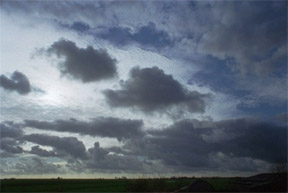Welcome to the Atmospheric Land EXchange Inversion (ALEXI)
Model Page.
 This
page is maintain by researchers at the University of Wisconsin-Madison's
Cooperative Institute for Meteorological Satellite Studies
(CIMSS) and the Department of Soil Sciences. This
page is maintain by researchers at the University of Wisconsin-Madison's
Cooperative Institute for Meteorological Satellite Studies
(CIMSS) and the Department of Soil Sciences.
This research is funded by grants from the National Aeronautic
and Space Administration (NASA) and National Oceanic and
Atmospheric Administration (NOAA) through 2003. The goals
of this research are the development of accurate daily land-surface
energy fluxes at 5-10 km horizontal resolution, and a flux
climatology based on these daily fluxes. This study is unique
in that the ALEXI model is driven primarily by remote sensing
inputs, namely GOES-8 and GOES-10 satellite radiances and
cloud information, as well as Normalized Differenced Vegetation
Index (NDVI) information derived with data from the Advance
Very High Resolution Radiometer (AVHRR) polar orbiting satellites.
Not only does our ALEXI model derive fluxes (sensible, latent,
ground heat and net radiation) during "clear sky" conditions,
but new methods allow for flux estimations beneath cloud
cover, provided a priori knowledge of previous-day flux partitioning,
rainfall and soil moisture conditions. |